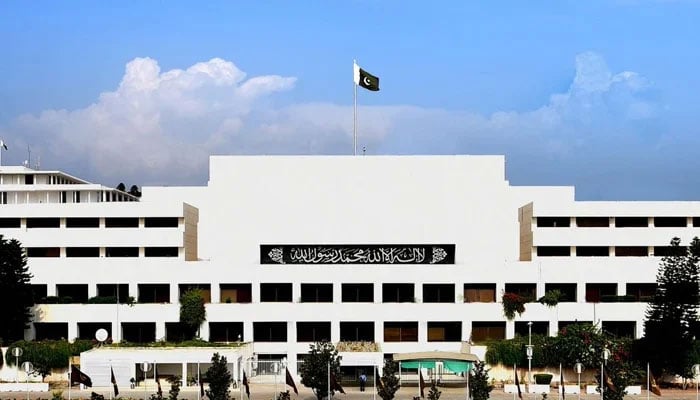Capital suggestion: Beyond politics
Pakistan operates under Westminster system, comprising three branches: the executive, the parliament, and the judiciary
Having been geographically away from Pakistan for some time provided me with a unique opportunity to observe the thematic focus of global discussions. I’m struck by the international conversation’s emphasis on pressing issues like economic trends, artificial intelligence’s potential impact, climate change solutions and the rapid pace of technological innovation. In stark contrast, upon my return to Pakistan, the focus is overwhelmingly dominated by a single topic: politics, politics, and more politics.
China has the ‘Party-State System’. The ‘party’ is the Communist Party of China (CCP) and the ‘state’ comprises the administration, parliament and the judiciary. The ‘party’ sets the overall policy direction. The ‘state’, including the administration, parliament and judiciary, implements these policies. The judiciary does not have the power to interpret. China’s ‘Party-State System’ has brought down the number of people living in extreme poverty from 883 million in 1981 to just six million in 2015 (World Bank).
Here is a partial list of countries that focused solely on economics and sidelined politics: Vietnam, South Korea, Malaysia, Bangladesh, Rwanda, Botswana, Costa Rica, Chile, Peru, Panama and Estonia. Vietnam sidelined politics and focused on trade liberalization. South Korea and Malaysia sidelined politics and focused on export-oriented industrialization. Bangladesh focused on its garment industry. Rwanda sidelined politics and focused on post-genocide economic reforms and good governance. Costa Rica focused on ecotourism. Estonia focused on IT.
Pakistan operates under the Westminster system, comprising three branches: the executive, the parliament, and the judiciary. Notably, both parliament and the judiciary are predominantly preoccupied with political matters. In contrast, the current executive branch appears to prioritize economic issues.
In all probability, this system is unlikely to deliver either effective governance or economic progress. The system has inherent imbalances and misaligned priorities. The overwhelming focus of parliament and the judiciary on political issues detracts both from their ability to address pressing economic and social challenges. Parliament’s and the judiciary's preoccupation with politics has three consequences: legislative gridlock, judicial inefficiencies, and a lack of cohesive policy implementation.
In all probability, the executive's isolated efforts to prioritize economics are insufficient without the support and collaboration of parliament and the judiciary. Consequently, the system's fragmented focus is hindering comprehensive and sustainable economic progress.
Here are the three things we need to do. One, a strategic shift in parliament and the judiciary’s focus on politics – and prioritization of economic development. Two, adopt a more integrated approach, similar to successful models seen in countries like South Korea and Estonia. Three, establish a unified policy direction with clear economic goals set by a central authority and collaboratively implemented across all three branches.
Drawing on empirical research conducted over the past five decades, a positive correlation exists between a legislature's focus on evidence-based economic policymaking and a nation's economic growth. Similarly, a judiciary focused on upholding contracts and facilitating efficient dispute resolution can attract investment and contribute to economic stability.
The writer is a columnist based in Islamabad. He tweets/posts @saleemfarrukh and can be reached at: farrukh15@hotmail.com
-
 Why Prince William Releases Statement On Epstein Scandal Amid Most 'challenging' Diplomatic Trip?
Why Prince William Releases Statement On Epstein Scandal Amid Most 'challenging' Diplomatic Trip? -
 Historic Mental Health Facility Closes Its Doors
Historic Mental Health Facility Closes Its Doors -
 Top 5 Easy Hair Fall Remedies For The Winter
Top 5 Easy Hair Fall Remedies For The Winter -
 Japan Elections: Stock Surges Record High As PM Sanae Takaichi Secures Historic Victory
Japan Elections: Stock Surges Record High As PM Sanae Takaichi Secures Historic Victory -
 Prince William, Kate Middleton Finally Address Epstein Scandal For First Time: 'Deeply Concerned'
Prince William, Kate Middleton Finally Address Epstein Scandal For First Time: 'Deeply Concerned' -
 Kim Kardashian Promised THIS To Lewis Hamilton At The 2026 Super Bowl?
Kim Kardashian Promised THIS To Lewis Hamilton At The 2026 Super Bowl? -
 Andrew Mountbatten-Windsor Throws King Charles A Diplomatic Crisis
Andrew Mountbatten-Windsor Throws King Charles A Diplomatic Crisis -
 Barack Obama Hails Seahawks Super Bowl Win, Calls Defense ‘special’
Barack Obama Hails Seahawks Super Bowl Win, Calls Defense ‘special’ -
 Pregnant Women With Depression Likely To Have Kids With Autism
Pregnant Women With Depression Likely To Have Kids With Autism -
 $44B Sent By Mistake: South Korea Demands Tougher Crypto Regulations
$44B Sent By Mistake: South Korea Demands Tougher Crypto Regulations -
 Lady Gaga Makes Surprising Cameo During Bad Bunny's Super Bowl Performance
Lady Gaga Makes Surprising Cameo During Bad Bunny's Super Bowl Performance -
 Paul Brothers Clash Over Bad Bunny's Super Bowl Performance
Paul Brothers Clash Over Bad Bunny's Super Bowl Performance -
 South Korea: Two Killed As Military Helicopter Crashes During Training
South Korea: Two Killed As Military Helicopter Crashes During Training -
 Elon Musk Unveils SpaceX’s Moon-first Strategy With ‘self Growing Lunar City’
Elon Musk Unveils SpaceX’s Moon-first Strategy With ‘self Growing Lunar City’ -
 Donald Trump Slams Bad Bunny's Super Bowl Performance: 'Absolutely Terrible'
Donald Trump Slams Bad Bunny's Super Bowl Performance: 'Absolutely Terrible' -
 Jake Paul Criticizes Bad Bunny's Super Bowl LX Halftime Show: 'Fake American'
Jake Paul Criticizes Bad Bunny's Super Bowl LX Halftime Show: 'Fake American'




